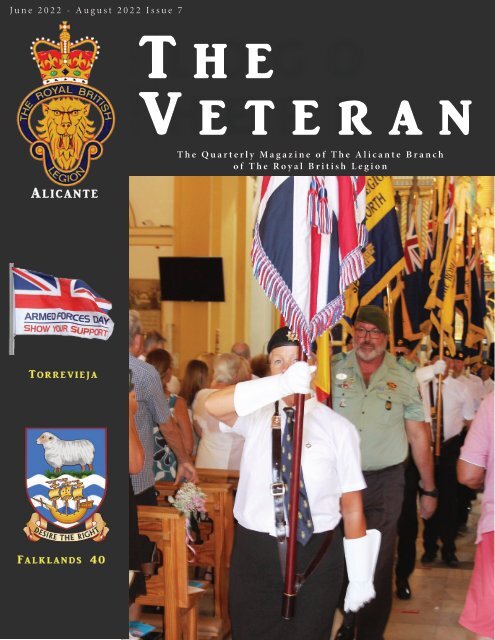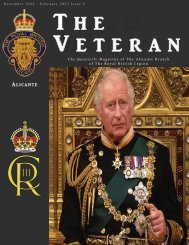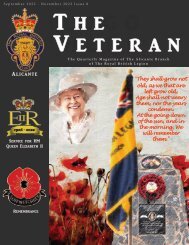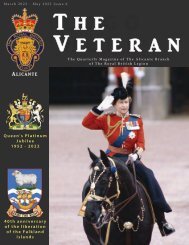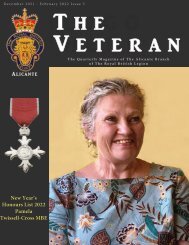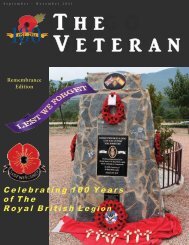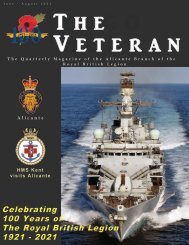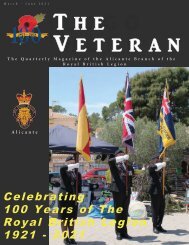The Veteran Issue 7
The Quarterly Magazine of the Alicante Branch of the Royal British Legion, issue 7 September 2022
The Quarterly Magazine of the Alicante Branch of the Royal British Legion, issue 7 September 2022
You also want an ePaper? Increase the reach of your titles
YUMPU automatically turns print PDFs into web optimized ePapers that Google loves.
June 2022 - August 2022 <strong>Issue</strong> 7<br />
<strong>The</strong><br />
<strong>Veteran</strong><br />
Alicante<br />
<strong>The</strong> Quarterly Magazine of <strong>The</strong> Alicante Branch<br />
of <strong>The</strong> Royal British Legion<br />
Torrevieja<br />
Falklands 40
TABLE OF<br />
CONTENTS<br />
3 Introduction, Sue Parkes - McConnachie, Branch<br />
Membership Secterary.<br />
5 General Service Medal 1962.<br />
6 'Least we Forget, <strong>The</strong> Northern Ireland Conflict.<br />
8 Who are we, <strong>The</strong> Royal British Legion'<br />
10 'We Served' HMS Resolution.<br />
14 40th Anniversary, Falklands Remembered.<br />
15 Armed Forces Day.<br />
17 Branch News.<br />
19 "We Served" <strong>The</strong> Ulster Defence Regiment.<br />
23 <strong>The</strong> Video page<br />
24 Forecast of Events<br />
25 Military Humour<br />
26 Poets Corner<br />
Contact us<br />
Ed Morris- Alicante Branch Chairman<br />
Les Dewson - Vice Chairman, Recruiting<br />
& Retention<br />
Janet Brickhill - Branch Community<br />
Support<br />
Hamish McConnachie - Web Master &<br />
Publicity<br />
Alicante.Chairman@rbl.community<br />
Alicante.Vicechairman@rbl.community<br />
Alicante.BCS@rbl.community<br />
Alicante.Web@rbl.community<br />
2
Sue Parkes McConnachie<br />
Alicante Branch<br />
Membership Secretary<br />
WWhen I was asked to do the introduction for the ‘<strong>Veteran</strong>’<br />
issue 7, the Quartery Magazine of the Alicante Branch of<br />
the Royal British Legion I felt so proud, as a fairly new<br />
member of the Legion(3 years) I am still a little unsure of how everything in the Legion<br />
works but I am happy to say that I am getting there so much so that I was confident<br />
enough to volunteer to become a Committee Member of the Alicante Branch and took<br />
up the position of Membership Secretary last October. Although many of you will know<br />
me personally I would like to take this opportunity to tell you a little about myself.<br />
I was born and brought up in Nottingham being educated at Highbank junior school as<br />
a child in Clifton and then onto Charnwood Bilateral school for girls where I have to say<br />
I was a bit of a nerd and really loved school which I left with a very good education.<br />
My goal was always to work in a bank but in those days you had to be eighteen years<br />
of age to join Barclays, as a space filler I went to work for the Navy, Army and Air Force<br />
Institute (NAAFI) at their offices in Nottingham handling Germany BFPO expenses.<br />
Just before my 18t birthday I applied and joined Barclays and went to college at the<br />
same time to pass my business studies exam, unfortunately I was very disappointed<br />
with my career in the bank and left to work for Boots the chemist in their Head Office.<br />
I worked within the Boots Group for 38 years where I worked in numerous departments<br />
and held different roles, Marketing and Sales for 17 years, and the rest in IT managerial<br />
roles finishing in a specialised role as Software and Hardware Asset Manager for the<br />
whole of UK and Europe, with letters after my name which I was very proud of, finally<br />
retiring when I was 58 so I could continue to enjoy my traveling passion.<br />
I feel very lucky to have been able to travel all over the world and have visited many<br />
countries and enjoying different cultures. Obviously one place I visited was Castalla in<br />
Spain which was where I met my husband Hamish. Hamish introduced me to the<br />
military and all that goes with it, and I have to say I love being part of the Queens Own<br />
Highlanders Regimental family, I have met some lovely people through Remembrance<br />
Sundays in London and various Reunions. I try and support Hamish in all he does and<br />
am very proud of him and his achievements within the Legion and other charitable<br />
organisations here in Spain.<br />
3
I am proud to<br />
be a Member<br />
of <strong>The</strong><br />
Alicante<br />
Branch of the<br />
Royal British<br />
Legion<br />
You don't have to<br />
have served to be a<br />
member of the<br />
Royal British Legion<br />
I have always wanted to do more which is why I<br />
volunteer when I can in fund raising events for the<br />
Royal British Legion Poppy Appeal which helps<br />
our serving servicemen, their families and veterans<br />
in many different ways.<br />
In taking on the role of Membership Secretary for<br />
the Alicante Branch which I must admit can be<br />
quite time consuming I have had the satisfaction of<br />
knowing that I have given something back to our<br />
Armed Forces Community and as an extra bonus I<br />
have met some new and interesting people<br />
through the Legion here in Spain. Remember that<br />
you don't have to be a member of the Armed<br />
Forces or a <strong>Veteran</strong> to join and that every cent<br />
raised in Spain stays in Spain.<br />
Hamish and I love our time in Spain but we both<br />
love to travel and experience new things so we<br />
may not always be around but will always give our<br />
best while we are here.<br />
“Thank you for your support”<br />
Every Cent raised in<br />
Spain stays in Spain<br />
Sue Parkes McConnachie with George and Joan Mollins<br />
at AFD 2022<br />
'Service Not Self '<br />
4
Military awards, medals and decorations of the United Kingdom<br />
General Service Medal 1962 Ribbon<br />
General Service<br />
Medal 1962<br />
(GSM)<br />
<strong>The</strong> General Service Medal 1962 (GSM<br />
1962, also refered sometimes as the<br />
Campaign Service Medal.) was<br />
introduced by the Ministry of Defence<br />
Order NO.61 dated 6th October 1962. It<br />
GSM 1962 with<br />
Northern Ireland Bar<br />
GSM 1962<br />
Reverse<br />
was to combine the three services (Royal Navy, Army andRoyal Air Force) so that they<br />
would have the one identical General Service Medal, with the appropriate clasp issued<br />
to the recipient. <strong>The</strong> 1962 GSM was awarded until 2007, when it was replaced by the<br />
Operational Service Medal.<br />
If the recipient had already been awarded the medal, then the additional clasp would<br />
be added to those already on the medal. Like its predecessors, the Naval General Service<br />
Medal (NSGM) and General Service Medal 1918-62 (GSM 1918-62), the GSM 1962 was<br />
not issued without a clasp. <strong>The</strong> clasps were worn on the GSM 1962 in the order that they<br />
were earned (reading from the bottom of the ribbon upwards), which is not necessarily<br />
the chronological order of the clasps institution.<br />
Those mentioned in despatches or who received a Queen’s Commendation during a<br />
campaign qualifying for the 1962 GSM wear an oak leaf symbol on the medal ribbon<br />
<strong>The</strong>re has been fourteen clasps awarded with this medal since it's inception:<br />
Cyprus 1963-64<br />
Borneo<br />
Radfan<br />
South Arabia<br />
Malay Peninsula<br />
South Vietnam<br />
Northern Ireland<br />
Dhofar<br />
Lebanon<br />
Mine Clearance, Gulf of Suez<br />
Gulf<br />
Kuwait<br />
N. Iraq & S. Turkey<br />
Air Operations Iraq<br />
5
"Least we Forget"<br />
<strong>The</strong> Northern Ireland<br />
Conflict<br />
'<strong>The</strong> Troubles'<br />
For 30 years, Northern Ireland was scarred by a period of deadly sectarian violence<br />
known as “the Troubles.” This explosive era was fraught with car bombings, riots and<br />
revenge killings that ran from the late 1960s through the late 1990s. <strong>The</strong> Troubles<br />
were seeded by centuries of conflict between predominantly Catholic Ireland and<br />
predominantly Protestant England. Tensions flared into violence in the late 1960s,<br />
leaving some 3,600 people dead and more than 30,000 injured.<br />
<strong>The</strong> origins of the Troubles date back to<br />
centuries of warfare in which the<br />
predominantly Catholic people of Ireland<br />
attempted to break free of British<br />
(overwhelmingly Protestant) rule. In 1921, the<br />
Irish successfully fought for independence<br />
and Ireland was partitioned into two<br />
countries: the Irish Free State, which was<br />
almost entirely Catholic, and the smaller<br />
Northern Ireland, which was mostly<br />
Protestant with a Catholic minority.<br />
While Ireland was fully independent, Northern<br />
Ireland remained under British rule, and the<br />
Catholic communities in cities like Belfast and<br />
Derry (legally called Londonderry)<br />
complained of discrimination and unfair<br />
treatment by the Protestant-controlled<br />
government and police forces. In time, two<br />
opposing forces coalesced in Northern<br />
Ireland largely along sectarian lines: the<br />
Catholic “nationalists” versus the Protestant<br />
“loyalists.”<br />
<strong>The</strong> conflict began during a campaign by the<br />
Northern Ireland Civil Rights Association to<br />
end discrimination against the Catholic/<br />
nationalist minority by the Protestant/unionist<br />
government and local authorities.<br />
<strong>The</strong> government attempted to suppress the<br />
protests. <strong>The</strong> police, the Royal Ulster<br />
Constabulary (RUC), were overwhelmingly<br />
Protestant and accused of sectarianism and<br />
police brutality. <strong>The</strong> campaign was also<br />
violently opposed by loyalists, who said it<br />
was a republican front. Increasing tensions<br />
led to the August 1969 riots and the<br />
deployment of British troops, in what<br />
became the British Army's longest<br />
operation. "Peace walls" were built in some<br />
areas to keep the two communities apart.<br />
Some Catholics initially welcomed the<br />
British Army as a more neutral force than<br />
the RUC, but soon came to see it as hostile<br />
and biased, particularly after Bloody Sunday<br />
in 1972.<br />
British<br />
Soldiers on<br />
patrol 1970<br />
6
Peacekeepers<br />
in Northern Ireland<br />
<strong>The</strong> British Government ordered the deployment<br />
of troops to Northern Ireland in August 1969.<br />
This was to counter the growing disorder<br />
surrounding civil rights protests and an increase<br />
in sectarian violence during the traditional<br />
Protestant marching season.<br />
<strong>The</strong> Roman Catholic population of Northern<br />
Ireland had little faith in the local police force,<br />
viewing the Royal Ulster Constabulary (RUC) as<br />
a pro-Protestant organisation. Initially, it was<br />
hoped that the British Army might be more<br />
readily accepted as a neutral peacekeeping<br />
force.<br />
<strong>The</strong> Army’s initial troop<br />
deployment proved insufficient<br />
and reinforcement was soon<br />
needed. Early on, the British<br />
developed the tactic of operating<br />
and patrolling from fortified bases<br />
in Northern Ireland's major towns.<br />
This set a pattern for the next 30<br />
years.<br />
In the countryside, particularly South<br />
Armagh's 'bandit country', the risk of<br />
ambush contributed to the Army's reliance<br />
on helicopters both to reconnoitre and ferry<br />
troops.<br />
<strong>The</strong> Army operated a 'tour of duty' policy for<br />
troops. <strong>The</strong> advantage of this was that<br />
soldiers had an end in sight and there was a<br />
limit to the length of their exposure to stress<br />
and danger. <strong>The</strong> disadvantage was that the<br />
build-up of experience and local knowledge<br />
could be curtailed and the benefits of<br />
continuity lost.<br />
More than 3,500 people were killed in the<br />
conflict, of whom 52% were civilians, 32%<br />
were members of the British security forces<br />
and 16% were members of paramilitary<br />
groups. Republican paramilitaries were<br />
responsible for some 60% of the deaths,<br />
loyalists 30% and security forces 10%. <strong>The</strong><br />
Northern Ireland peace process led to<br />
paramilitary ceasefires and talks between<br />
the main political parties, which resulted in<br />
the Good Friday Agreement of 1998.<br />
"LEAST<br />
WE<br />
FORGET"<br />
7
WHO<br />
ARE<br />
WE<br />
<strong>The</strong> Royal British Legion is at the heart of a national network that<br />
supports our Armed Forces community.<br />
We're here through thick and thin – ensuring their unique contribution is never<br />
forgotten. We've been here since 1921 and we'll be here as long as they need us.<br />
We are the UK's largest Armed Forces charity and we have many Branches<br />
throughout the world, with 180,000 members, 110,000 volunteers and a network of<br />
partners and charities; helping us give support wherever and whenever it’s needed.<br />
We provide lifelong support to serving and ex-serving personnel<br />
and their families.<br />
Our support starts after one day of service and continues through<br />
life, long after service is over.<br />
From providing expert advice and guidance, to recovery and rehabilitation, through<br />
to transitioning to civilian life – we can be by their side every step of the way. And it’s<br />
not just members of the Armed Forces but their families too.<br />
If there is ever a reason we can't help, our vast network will mean that we know<br />
someone who can.<br />
8
Every year we lead the nation in commemorating and honouring<br />
those who have served and sacrificed.<br />
We remember those who lost their lives on active service in all conflicts; from the<br />
beginning of the First World War right up to the present day, as well as all those who<br />
have served and their families.<br />
Every year in November, we distribute our paper poppies to raise vital funds to help<br />
today's Armed Forces community. And it wouldn’t be possible without our incredible<br />
supporters.<br />
Whether you’re a volunteer, member or proud Poppy Appeal collector – or however<br />
you choose to support us – we couldn’t do it without you.<br />
Poppy Appeal Launch (PAL)2022 Spain.<br />
This years District North Spain's Poppy Appeal Launch Will take place in Benidorm<br />
on the 15th of October.<br />
Alicante Branch Acts of Remembrance.<br />
<strong>The</strong> Alicante Branch will hold the following acts of Remembrance:<br />
11th November: Armistice Day Parade and Service at International Club El<br />
Campello.<br />
13th November: Remembrance Sunday Parade and Service at the Remembrance<br />
Garden Castalla International. 9
"WE SERVED"<br />
HMS<br />
RESOLUTION<br />
<strong>The</strong> Navy's First<br />
Polaris Submarine<br />
It was decided that the United<br />
Kingdom would have four<br />
Polaris submarines to carry<br />
the latest A-3 missiles; that the<br />
submarines would be British<br />
designed and built; that the whole<br />
weapon systems and equipment,<br />
except warheads, would be<br />
purchased from the United States;<br />
and that the warheads would be<br />
British. <strong>The</strong> Government directive<br />
was explicit; the four SSBNs (Ship<br />
Submersible Ballistic Nuclear) were<br />
to be deployed at the earliest<br />
possible date and the programme<br />
executed within the allotted budget.<br />
'A challenge had been issued and a<br />
challenge was going to be met'.<br />
Les Dewson 1977 - 2010<br />
Submariner<br />
Dolphins<br />
Badge<br />
First officially adopted in the<br />
1950s, qualified submariners are<br />
presented the Golden Dolphins badge to wear<br />
on their uniform on the left breast above any<br />
medals. <strong>The</strong> current badge, adopted in 1972,<br />
depicts two golden dolphins facing an anchor<br />
surmounted by St Edwards Crown.<br />
10
<strong>The</strong> Ministry of Defence<br />
planned, in 1963, to fire<br />
Britain's first Polaris missile at<br />
11.15 Eastern Standard Time<br />
on 15th February 1968 - HMS<br />
Resolution failed to achieve<br />
this by 15 milliseconds, but the<br />
firing was otherwise fully<br />
successful!<br />
<strong>The</strong> Royal Yacht Britannia at Faslane Scotland<br />
with HMS Resolution in the foreground<br />
Ordered in May 1963, she was built by<br />
Vickers Armstrong at a cost of £40.2m.<br />
<strong>The</strong> keel was laid down on 26 February<br />
1964 by the Director General Ships, Sir<br />
Alfred Sims, and the launch was on 15<br />
September 1966, attended by Queen<br />
Elizabeth the Queen Mother. <strong>The</strong><br />
submarine was commissioned on 2<br />
October 1967, and following extensive<br />
trials, including the firing of her first<br />
Polaris missile on 15 February 1968,<br />
commenced her first patrol on 15 June<br />
1968. Being the United Kingdom's contribution to NATOs strategic nuclear<br />
deterrent, at least one Polaris submarine was constantly on patrol, sailing<br />
submerged 'one knows not where', but always carrying her deadly 'cargo' of twostage<br />
ballistic missiles.<br />
'Sherwood Forest' was the nickname given to the compartment housing these 16<br />
missiles, which were 31 feet long, 4½ feet in diameter and weighed 28,000<br />
pounds. Fired from the submerged submarine, the multiple nuclear warheads<br />
could soar into the stratosphere and devastate a target 2,500 nautical miles<br />
away. One Polaris submarine carried more destructive potential than the total<br />
amount of explosives expended by all sides in the Second World War.<br />
11
When a Polaris submarine heads out<br />
into the open sea, the crew settles down<br />
to a life of routine, where days passed<br />
relatively quickly, but time seemed to<br />
stand still. <strong>The</strong>ir main activities were<br />
devoted entirely to ensuring that the<br />
secrecy of their position was preserved,<br />
and that the deadly missiles were always<br />
ready to fulfill their ultimate purpose. To<br />
make the fullest use of Polaris<br />
submarines, each had two crews -<br />
known as Port and Starboard - which<br />
took turn and turnabout in the two-month<br />
patrol cycle.<br />
Food assumes an importance beyond its<br />
intrinsic value, and plays a large part in<br />
influencing the morale of those onboard.<br />
Resolution, first of it's name.<br />
50-gun third-rate frigate launched<br />
1654 as Tredagh; renamed Resolution<br />
1660; destroyed after grounding by a<br />
Dutch fireship in the St James's Day<br />
Battle 4 August 1666.<br />
Resolution, seventh of it's name.<br />
HMS Resolution (1771), the vessel of<br />
Captain James Cook in his<br />
explorations<br />
<strong>The</strong>re have been eleven HMS<br />
Resolutions from 1660 - 1994<br />
From the small galley of a Polaris submarine, three cooked meals a day were<br />
prepared for the 143 officers and men - in an eight-week patrol, the equivalent of<br />
feeding a family of four for five years.<br />
<strong>The</strong> primary source of power for Polaris<br />
submarines was a pressurised water<br />
nuclear reactor, which provided steam<br />
for the propulsion turbines and turbogenerators.<br />
Systems for everyday<br />
running range from high and low<br />
voltage electrical power, steam,<br />
hydraulic, pneumatic, lubricating oil and<br />
water for essential ship's services, to<br />
freshwater, air-conditioning and<br />
refrigeration for domestic purposes. A<br />
HMS Resolution<br />
network of communications and control<br />
systems is used for the transmission of information, for direction of remote<br />
services, and for round-the-clock monitoring of conditions throughout the ship.<br />
One of the most important events in the work-up of a Polaris submarine was the<br />
Demonstration and Shakedown Operation (DASO), which was conducted off<br />
Cape Kennedy in Florida.<br />
This operation culminated in the firing of a Polaris missile down the US Air Force<br />
Eastern Test Range to a target up to 2500 nautical miles away.<br />
12
Alleged use during the Falklands<br />
War<br />
During the early stages of the<br />
Falklands War, the BBC World News<br />
reported that Resolution was<br />
stationed off Buenos Aires. A similar<br />
story appeared in 1984 in the New<br />
Statesman which alleged that<br />
Resolution was sent south, as a<br />
means of launching a nuclear attack<br />
against Córdoba in the event that a<br />
Royal Navy aircraft carrier be sunk.<br />
In reality, Resolution's crew were<br />
having to deal with an upsurge of<br />
Soviet SSN activity, with Resolution<br />
having to take evasive action to avoid<br />
a November-class submarine. Despite<br />
Soviet efforts, Resolution was never<br />
found during her 72-day patrol.<br />
Les Dewson first group rear rank second from left.<br />
Polaris submarines were designed to<br />
carry, and maintain in a state of<br />
readiness to fire, 16 Type A-3 Polaris<br />
missiles in addition to their<br />
conventional torpedo armament. <strong>The</strong><br />
Admiralty believe that if the missiles<br />
were ever employed they will have<br />
failed in their purpose of preventing<br />
war.<br />
Following the completion of the first<br />
Trident-carrying Vanguard-class<br />
submarine in 1992, the Resolution<br />
class were gradually removed from<br />
service. Resolution was<br />
decommissioned on 22 October 1994,<br />
after 69 patrols, and laid up at the<br />
Rosyth Dockyard. She remains in the<br />
main basin at Rosyth, intact but with<br />
her reactor defueled<br />
13
Alicante Branch<br />
Remembers<br />
those impacted<br />
by the conflict.<br />
On the 14th June at 12:00 the Alicante Branch held a simple service to commemorate the 40th<br />
Anniversary of the Falklands Conflict. Vice Chairman and Falklands <strong>Veteran</strong> (HMS Hermes) Ed Morris<br />
welcomed the Branch and Community members to the service followed by the Eulogy given by Branch<br />
President and Falklands <strong>Veteran</strong> (4 Fd Regt RA) Jack Kemp. Ed Morris laid a single wreath to the<br />
fallen whilst “<strong>The</strong> Song of the Falklands” played in the background. Following the Last Post and<br />
Reveille Jack Kemp gave the Exhortation. Mary Kemp read a poem by Jim ‘Jock’ Love, Branch<br />
Member and Falklands <strong>Veteran</strong>. <strong>The</strong> service was concluded with the National Anthem of the Argentine<br />
republic and the National Anthem of the United Kingdom. <strong>The</strong> Kohima Epitaph was given by Branch<br />
Chairman John Pratt.<br />
Branch Chairman John Pratt carried the Union Flag whilst Branch Standard Bearer Mary Kemp carried<br />
the Branch Standard.<br />
Branch Vice Chairman (Now Chairman) Ed Morris with Branch Chairman John Pratt (Union Flag)<br />
and Branch Standard Bearer Mary Kemp (Branch Standard)
Armed Forces Day<br />
25th June 2022 Torrevieja<br />
Armed forces Day was held at the Church of the<br />
Immaculate Conception in Torrevieja on the 25th of June.<br />
<strong>The</strong> Alicante Branch was well represented on this very<br />
important day supplying two Standard Bearers to carry<br />
both the Union Flag of the United Kingdom and the Royal<br />
British Legion Spain District North Standard as well as<br />
having several Branch members in the Congregation.<br />
Branch Members in attendance would like to take this opportunity to thank the organisers of<br />
AFD 2022 in Torrevieja for the hard work put into organising a well worked parade and<br />
service.<br />
Alicante<br />
Branch<br />
Standard<br />
Bearers<br />
John Pratt (Left)Branch Chairman and Deputy Standard Bearer with the District Standard and Mary<br />
Kemp Branch Standard Bearer with the Union Flag of the United Kingdom<br />
15
Branch Webmaster and Publicity Member Hamish McConnachie (left) and Branch Member Steve Berridge<br />
L to R John Pratt, Sue Parkes McConnachie, George Mollins, Joan Mollins and Mary Kemp 16
New Committee<br />
Members<br />
With the resignation of our Branch Treasurer in<br />
July the Alicante Branch Committee had a reshuffle<br />
to fill vacant posts. Our Chairman John<br />
Pratt has moved to take on the vital roll of<br />
Les Dewson Branch Vice Chairman<br />
Treasurer whilst Vice Chairman Ed Morris<br />
fills the role of Chairman on a temporary basis. <strong>The</strong> Vice Chairmans role has<br />
been taken up by Branch stalwart Les Dewson.<br />
<strong>The</strong> Vacancy of Branch Secretary was taken up by Tony Horton. <strong>The</strong> new<br />
Chairman and the remainder of the Committee would like to welcome Les and<br />
Tony to the Committee.<br />
New Branch Secretary<br />
Tony Horton<br />
Branch Committee<br />
2022 - 2023<br />
Branch Members are reminded that Branch<br />
Committee posts come up for re-election at the<br />
Branch AGM in October. Branch Members will be<br />
able to put their names forward for any of the<br />
Committee positions prior to this date, if two or more<br />
members wish be considered for the same post<br />
then there will be a vote by Branch Members. Full<br />
details of the procedure will be sent out in<br />
September by the Branch Chairman Ed Morris.<br />
Support Your Branch<br />
Consider Becoming a Committee<br />
Member<br />
17
Spain District North<br />
Magazine Summer<br />
2022<br />
(Click on the photo)<br />
Obituary<br />
Terry Martin Burt<br />
At Alcoi Hospital on Tuesday<br />
2nd August 2022. Peacefully<br />
after a long illness.<br />
Condolences to his wife Lynn<br />
and his Daughter Nicola and<br />
his extended family.<br />
<strong>The</strong> 2022 District North Spain Poppy<br />
Appeal Launch (PAL) will be taking<br />
place in Benidorm on the 15th<br />
October 2022<br />
Gone But Not Forgotten<br />
18
'We Served'<br />
<strong>The</strong><br />
Ulster<br />
Defence<br />
Regiment<br />
Origins<br />
In 1969, civil unrest was starting to<br />
escalate in Northern Ireland. <strong>The</strong><br />
Royal Ulster Constabulary (RUC)<br />
and Ulster Special Constabulary<br />
(USC) were proving overstretched,<br />
Hamish McConnachie served with the 3rd (County<br />
Down) Bn <strong>The</strong> Ulster Defence Regiment as Signals<br />
Permanant Staff Instructor from 1989 to 1991<br />
ineffective and mistrusted by the Catholic community. In the wake of riots, the Hunt<br />
Report - providing advice on policing in Northern Ireland - recommended a locally<br />
recruited 4,000-man part-time non-sectarian force to take over military duties from the<br />
RUC and replace the USC. An act of parliament to form this new unit came into force in<br />
January 1970.<br />
Role<br />
<strong>The</strong> UDR’s main tasks were guarding key points, patrolling, surveillance, and manning<br />
vehicle check points. As they were recruited from the community where they served, they<br />
were never used for crowd control or riot duties.<br />
Over 190 UDR soldiers were killed on active service, the vast majority by Republican<br />
paramilitaries. Another 61 were killed after leaving the regiment.<br />
19
Greenfinches<br />
In 1973, the regiment began to recruit women for<br />
clerical, radio and telephone roles to free up men for<br />
patrol duties. <strong>The</strong>y became known as 'Greenfinches' and,<br />
although unarmed, were fully integrated into the unit<br />
from the start. This was in contrast to the personnel of<br />
the Women’s Royal Army Corps, who only merged into<br />
the British Army in 1992.<br />
Over 190 UDR<br />
soldiers were killed<br />
on active service<br />
UDR Cap Badge<br />
Structure<br />
<strong>The</strong> unit was initially formed with<br />
seven battalions, the highest<br />
number for a single regiment in the<br />
British Army at that time.<br />
Four more had been added by 1972. In 1976, it ceased to be solely a part-time unit, when<br />
it was given a cadre of full-time troops. Later, these expanded to make up half the force.<br />
Its 11 battalions were reduced to nine in 1984, and then seven in 1991.<br />
A soldier of the Black Watch<br />
changes headgear with a UDR<br />
Greenfinch<br />
Collusion<br />
Loyalist paramilitaries attempted to infiltrate the UDR and<br />
several members of the regiment were involved in sectarian<br />
crimes. Other soldiers were expelled for supplying weapons to<br />
Loyalists or for being members of paramilitary organisations.<br />
Alongside its largely Protestant make-up, such incidents<br />
meant the UDR was distrusted by many in the nationalist<br />
community. However, while the regiment came under<br />
sustained criticism in the press and from politicians, the vast<br />
majority of its soldiers served with honour and upheld the<br />
law.<br />
Legacy<br />
In 1992, the UDR merged with <strong>The</strong> Royal Irish Rangers to<br />
form <strong>The</strong> Royal Irish Regiment (27th (Inniskilling), 83rd and<br />
87th and the Ulster Defence Regiment), becoming the new<br />
unit's Home Service battalions.<br />
20
3rd (County Down) Bn<br />
Along with the other six original battalions,<br />
3 UDR commenced operational duties on 1<br />
April 1970. Battalion Headquarters were<br />
located at Ballykinler Army Base which is<br />
also home to Abercorn Barracks where<br />
another British unit would be on a 2-year<br />
posting. Bases were also located in Kilkeel<br />
and Rathfriland.<br />
<strong>The</strong> first commanding officer (CO) was Lt<br />
Col Desmond Woods MC and bar. Woods<br />
had won the MC with the Royal Ulster Rifles in Palestine during 1938, at that time he was<br />
the youngest holder of the award. He won his bar to the MC in Italy in 1944, prior to his<br />
appointment as Commanding officer of 3 UDR he had been the County Commandant of<br />
the Ulster Special Constabulary for County Down from 1958. In his earliest days as CO,<br />
Woods made it clear that he welcomed Catholics into his battalion.<br />
<strong>The</strong> first training major (TISO - training int and security officer) was Major GJ Entwistle,<br />
who was sent to the old hutted camp at Ballykinler. Part of his job was to find<br />
accommodation for the various companies of the new battalion. <strong>The</strong> Battalion was<br />
affiliated to the Scottish Division who supplied their Commanding Officer, Training<br />
Major, RSM and Permanent Staff Instructors<br />
In 1989 the battalion recorded over 900,000 man-hours of duty and the notable success<br />
of, in a joint operation with the Royal Ulster Constabulary, discovering a "highly<br />
sophisticated" arms factory which turned out homemade submachine guns for a loyalist<br />
terror group.<br />
In 2006, the regiment was retrospectively awarded the Conspicuous Gallantry Cross in<br />
recognition of its services<br />
Attached Permanent Staff members of<br />
the 3rd (County Down) Bn <strong>The</strong> Ulster<br />
Defence Regiment from the Scottish<br />
Division 1990.
Who we<br />
help<br />
<strong>The</strong> Royal British Legion is here to<br />
help members of the Royal Navy,<br />
British Army, Royal Air Force,<br />
veterans and their families.<br />
And we’re not going anywhere.<br />
Our support starts after one day of service and continues through<br />
life, long after service is over<br />
<strong>The</strong> Royal British Legion has 96<br />
branches outside the United<br />
Kingdom. Just because you<br />
aren't based in the UK doesn't<br />
mean we can’t help you. You can<br />
use the main RBL website to<br />
search for overseas branches and<br />
find one near you.<br />
https://www.britishlegion.org.uk/#<br />
22
<strong>The</strong> Video Page<br />
Our Video page is designed to complement and give further information on articles<br />
that appear within the <strong>Veteran</strong>.<br />
Click Here<br />
Click Here<br />
Commissioning Of HMS Resolution (1967) Armed Forces Day 2022<br />
Click Here<br />
Click Here<br />
<strong>The</strong> Ulster Defence Regiment<br />
OP Banner Reflections<br />
Northern Ireland Troubles<br />
23
Forecast of Events<br />
Alicante Branch meets at 12:00 pm on the 1st<br />
Thursday of the month:<br />
All meetings are followed by a Social Lunch within the local area.<br />
Our weekly casual 'Meet & Greet' takes place at the No Problem<br />
Bar on Thursdays at 15:00. Come along and meet some of the<br />
members.<br />
1st September : Monthly Meeting at the International Club El<br />
Campello followed by lunch.<br />
6th October: Annual General Meeting at Glenn's Castalla followed<br />
by lunch.<br />
15th October: Poppy Appeal Launch(PAL) Benidorm.<br />
3rd November: Monthly Meeting at International Club El Campello<br />
followed by lunch.<br />
11th November: Armistice Day Parade and Service at International<br />
Club El Campello.<br />
13th November: Remembrance Sunday Parade and Service at the<br />
Remembrance Garden Castalla International.<br />
December: No Monthly Meeting.<br />
TBC December: Branch Pre Christmas lunch.<br />
24
Russian army was thought to<br />
be the second best army in the<br />
world...<br />
... It turns out it's only the<br />
second best army in Ukraine<br />
MILITARY HUMOUR<br />
Just before a paratrooper had his<br />
first parachute jump, his sergeant<br />
reminded him,<br />
"Count to ten, and then pull the<br />
first rip cord. If it snarls, pull the<br />
second rip cord for your auxiliary<br />
chute. After you land, our truck<br />
will pick you up."<br />
<strong>The</strong> paratrooper took a deep breath<br />
and jumped. He counted to ten and<br />
pulled the first cord. Nothing<br />
pulled the second cord. Again,<br />
nothing happened.<br />
As he plummeted to the ground, he<br />
said to himself, "I'll bet that truck<br />
won't be there either!"<br />
NATO Commander in the desert. asked a<br />
group of troops. "if you found a scorpion<br />
in your tent. What would you do?" ARMY<br />
said "I would throw a boot at it." Marine<br />
said" I would pick it up by the tail/stinger<br />
& eat it. Air Force said "I would call Room<br />
service & ask why is there a tent in my<br />
Room?"<br />
What happened to the navy officer who<br />
went to see a mind reader? Apparently,<br />
there was no charge<br />
How many successful jumps does a<br />
paratrooper have to make before he is<br />
ready for combat?<br />
All of them.
Poets<br />
Corner<br />
A Soldier Died Today<br />
He was getting old and paunchy And his hair was falling fast,<br />
And he sat around the Legion, Telling stories of the past.<br />
Of a war that he once fought in And the deeds that he had done,<br />
In his exploits with his buddies; <strong>The</strong>y were heroes, every one.<br />
And 'tho sometimes to his neighbors His tales became a joke,<br />
All his buddies listened quietly For they knew where of he spoke.<br />
But we'll hear his tales no longer, For ol' Joe has passed away,<br />
And the world's a little poorer For a Soldier died today.<br />
He won't be mourned by many, Just his children and his wife.<br />
For he lived an ordinary, Very quiet sort of life.<br />
He held a job and raised a family, Going quietly on his way;<br />
And the world won't note his passing, 'Tho a Soldier died today.<br />
When politicians leave this earth, <strong>The</strong>ir bodies lie in state,<br />
While thousands note their passing, And proclaim that they were<br />
great.<br />
Papers tell of their life stories From the time that they were young<br />
But the passing of a Soldier Goes unnoticed, and unsung.<br />
Is the greatest contribution To the welfare of our land,<br />
Some jerk who breaks his promise And cons his fellow man?<br />
Or would you want a Soldier, His home, his country, his kin,<br />
Just a common Soldier, Who would fight until the end.<br />
He was just a common Soldier, And his ranks are growing thin,<br />
But his presence should remind us We may need his likes again.<br />
For when countries are in conflict, We find the Soldier's part<br />
Is to clean up all the troubles That the politicians start.<br />
If we cannot do him honor While he's here to hear the praise,<br />
<strong>The</strong>n at least let's give him homage At the ending of his days.<br />
Perhaps just a simple headline In the paper that might say:<br />
"OUR COUNTRY IS IN MOURNING, A SOLDIER DIED<br />
TODAY."<br />
Unknown<br />
After <strong>The</strong> War<br />
<strong>The</strong>re’s a tear in the fabric of his being<br />
... Where the memories lie waiting to remind him<br />
... Of the horror and the carnage<br />
That is cataloged as war<br />
Which civilians never see<br />
For it’d shatter their reality<br />
And leave them in a state of what<br />
To call it I don’t know<br />
But it’s tipped the balance<br />
Of the G I Joe<br />
Who comes to calmer waters<br />
Where life’s normal once again<br />
But he’s having trouble fitting in<br />
For he’s shaken bad internally;<br />
it’s a price they paid for defending<br />
But the dreams are never ending.<br />
Or the ordinary fellow Who in times of war and strife,<br />
Goes off to serve his country And offers up his life?<br />
<strong>The</strong> politician's stipend And the style in which he lives,<br />
Are often disproportionate, To the service that he gives.<br />
While the ordinary Soldier, Who offered up his all,<br />
Is paid off with a medal And perhaps a pension, small.<br />
It is not the politicians With their compromise and ploys,<br />
Who won for us the freedom That our country now enjoys.<br />
Should you find yourself in danger, With your enemies at hand,<br />
Would you really want some cop-out, With his ever waffling stand?<br />
Social Media<br />
Tell me, which is the winner, pen or sword?<br />
Soldier or poet, who should we applaud?<br />
Debates may rage over the rule of things,<br />
By foolish governments or noble kings,<br />
And still the people wonder what is best,<br />
What suits the few will never suit the rest,<br />
Forget if sword is mightier than pen:<br />
Lies on the Internet beat both of them!<br />
26
<strong>The</strong> Alicante Branch<br />
of the<br />
Royal British Legion<br />
"Service not Self "<br />
Visit our website at<br />
http://branches.britishlegion.org.uk/branches/alicante


